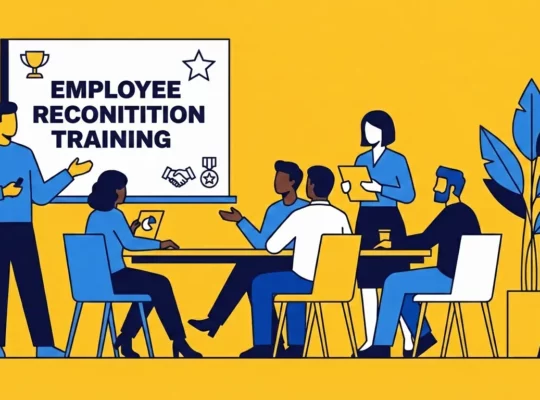The psychological contract, an unwritten agreement between employees and employers, shapes expectations, trust, and mutual commitment in the workplace. As modern workplaces evolve, understanding and managing psychological contracts is critical to fostering strong relationships between employers and employees. At Review.jobs, we believe this concept can redefine how organizations engage with their teams to ensure satisfaction and organizational success.
Table of Contents
- The Foundations of the Psychological Contract
- Why a Psychological Contract Matters in the Workplace
- Strategies to Build and Maintain a Strong Psychological Contract
- How Review.jobs Helps Employers Strengthen the Psychological Contract
- Recognizing and Addressing Breaches in the Psychological Contract
- The Future of Psychological Contracts in a Changing Workplace
The Foundations of the Psychological Contract
Scholars like Denise Rousseau popularized the concept of the psychological contract, which is rooted in social exchange theory. Over time, the workplace has shifted from rigid, formal relationships to a more dynamic, expectation-driven approach, reflecting the evolving needs of employees and employers.
What Is a Psychological Contract?
A psychological contract is an unwritten set of expectations between employees and employers, encompassing mutual beliefs, informal obligations, and perceived promises. Unlike formal employment contracts, which outline specific roles, responsibilities, and benefits, psychological contracts deal with intangible elements such as respect, trust, fairness, and career development.
The 5 Key Components of the Psychological Contract
The psychological contract consists of several critical components that shape the expectations and perceptions between employees and employers. These elements are pivotal in maintaining trust, engagement, and mutual satisfaction in the workplace.
1. Mutual Expectations
The foundation of the psychological contract lies in the mutual, often unspoken, expectations between the employee and the employer.
- Employee Expectations: Employees often anticipate fair compensation, opportunities for career advancement, recognition for their contributions, and a supportive work environment. These expectations may vary based on individual goals, cultural norms, and organizational culture.
- Employer Expectations: Employers, on the other hand, expect employees to demonstrate loyalty, deliver consistent performance, and align with organizational values and objectives. Employers may also assume employees will maintain confidentiality, adapt to changes, and contribute to a positive workplace culture.
2. Trust and Informal Agreements
Research by Deloitte reports that 79% of employees who trust their employer report being more motivated and are far less likely to leave their job?
- Building Trust: Employers build trust through actions such as transparent communication, fair treatment, and honoring commitments.
- Sustaining Trust: Employees sustain trust by fulfilling job responsibilities, adhering to workplace norms, and actively participating in the organization’s success.
3. Psychological Contract Elements
These are specific aspects of the psychological contract that reflect the organization’s values and practices. Examples include:
- Fair Treatment: Employees expect to be treated equitably, irrespective of their role or background. Perceived favoritism or bias can lead to dissatisfaction and disengagement.
- Opportunities for Growth: Providing avenues for professional development—such as training programs, promotions, and challenging projects—aligns with employee aspirations and builds loyalty.
- Supportive Work Environment: Employees value a workplace that prioritizes well-being, inclusivity, and work-life balance.
- Recognition and Feedback: Acknowledging accomplishments and providing constructive feedback help employees feel valued and motivated.
4. Reciprocity
The psychological contract thrives on reciprocity—an implicit understanding that both parties will uphold their side of the agreement. For instance:
- If employees go above and beyond during a busy period, they may expect flexibility or acknowledgment in return.
- Similarly, if an employer invests in employee training, they expect improved performance and loyalty as a result.
5. Dynamic Nature of the Psychological Contract
Psychological contracts are not static; they evolve as workplace conditions, organizational goals, and individual expectations change.
- New Hires: Early in their employment, employees may place significant emphasis on orientation and goal setting.
- Seasoned Employees: Over time, priorities may shift toward autonomy, meaningful projects, or leadership roles.
- Organizational Adjustments: Changes in company strategy or economic conditions may also require renegotiating psychological contracts to reflect new realities.
Why a Psychological Contract Matters in the Workplace
Psychological contracts directly influence workplace dynamics and organizational success.
Impact on Employee Engagement and Retention
- Employee Engagement: Meeting expectations boosts motivation and productivity. Conversely, unmet expectations lead to disengagement.
- Retention: Trusting employees are 50% less likely to quit their jobs. An organization where psychological contracts are respected is a trustworthy one.
Role in Organizational Culture and Performance
- Psychological contracts create a shared understanding that fosters a positive culture.
- Balanced contracts lead to higher organizational performance.
Examples of Balanced vs. Imbalanced Contracts
| Balanced Contract | Imbalanced Contract |
| Open communication and mutual respect | Lack of clarity and unmet promises |
| Opportunities for growth and recognition | Neglect of employee contributions |
| Fair treatment in workload and rewards | Favoritism and inconsistent policies |
Strategies to Build and Maintain a Strong Psychological Contract
Maintaining a robust psychological contract requires deliberate strategies that prioritize mutual respect, clear communication, and ongoing alignment of expectations. Here’s how employers can proactively build and sustain these intangible agreements:
1. Develop Comprehensive Onboarding Programs
The psychological contract begins to form from the moment an employee is hired. A well-structured onboarding program can boost the engagement of 89% of employees:
- Clarify Roles and Responsibilities: Clearly outline job duties and expectations during onboarding to avoid ambiguity.
- Introduce Organizational Values: Reinforce the company’s mission, vision, and culture to establish a shared understanding.
- Foster Early Engagement: Provide new hires with opportunities to voice their questions and concerns to ensure alignment from the outset.
2. Invest in Management Training
Managers act as the bridge between the organization and employees, making their role crucial in upholding psychological contracts.
- Training in Emotional Intelligence: Equip managers with skills to navigate sensitive conversations and recognize unmet expectations.
- Conflict Resolution Skills: Train managers to handle conflicts effectively, especially when potential breaches arise.
- Leadership Development: Focus on developing managers who can inspire trust, foster engagement, and align team goals with organizational objectives.
3. Build a Culture of Fairness and Growth
The psychological contract thrives in a work environment that prioritizes fairness, inclusivity, and equality in leadership.
- Equitable Treatment: Ensure consistent application of policies and practices to avoid perceptions of favoritism or unfairness.
- Career Development Opportunities: Provide access to training, mentorship, and growth pathways that align with employee aspirations.
- Work-Life Balance: Offer flexible schedules, remote work options, or wellness programs that support employees’ personal needs.
4. Encourage Open and Transparent Communication
Strong communication practices are the cornerstone of psychological contract fulfillment.
- Frequent Check-Ins: Regular one-on-one meetings help managers stay attuned to employee concerns and evolving expectations.
- Transparency During Changes: Be upfront about organizational changes, addressing potential impacts on employees to maintain trust.
- Active Listening: Ensure employees feel heard by responding thoughtfully to their feedback and concerns.
5. Leverage Employee Reviews
Regular performance and feedback reviews play a vital role in maintaining the psychological contract by offering insights into employee satisfaction and employer expectations.
- Two-Way Feedback: Conduct reviews that allow employees to share their perspectives, fostering an open dialogue.
- Address Concerns Promptly: Use feedback to identify and address potential breaches in the psychological contract before they escalate.
- Celebrate Achievements: Recognize and reward employees for meeting or exceeding expectations, reinforcing trust and motivation.
How Review.jobs Helps Employers Strengthen the Psychological Contract
Review.jobs empowers employers to strengthen the psychological contract by providing a certified employee review management solution. By fostering open communication and aligning mutual goals, the platform helps create a workplace where employees feel valued, leading to higher satisfaction and organizational success.
Importance of Transparent and Constructive Reviews
Reviews allow employees and employers to align expectations, identify gaps, and strengthen relationships.
How Anonymous Reviews Foster Trust
Platforms like Review.jobs facilitate anonymous reviews, encouraging honest feedback. This transparency helps organizations address concerns proactively, fostering trust and psychological contract fulfillment.
Rebuilding Breached Contracts
Employee reviews provide insights into issues stemming from a psychological contract breach, guiding employers in rebuilding trust and redefining expectations.
Recognizing and Addressing Breaches in the Psychological Contract
Breaches of the psychological contract can be subtle yet profoundly impactful, creating ripples across the workplace.
Common Causes of Breaches
1. Lack of Communication
When communication breaks down, misunderstandings arise. For example, if employees are not informed about changes in company policies or goals, they may feel excluded or undervalued. This lack of clarity often leads to a sense of disengagement, eroding trust in the employer.
2. Unmet Promises
Employers may unintentionally breach the psychological contract by failing to deliver on perceived commitments, such as promised promotions, raises, or flexibility in work arrangements. Even small unmet promises can accumulate into significant dissatisfaction, especially when employees feel their loyalty is not reciprocated.
3. Unclear Expectations
Vague or shifting job responsibilities can leave employees feeling overwhelmed or unsure about their roles. This ambiguity undermines their confidence in the organization and creates friction in the employee-employer relationship.
Steps to Repair and Rebuild Trust
Addressing a breach requires intentional effort and a commitment to rebuilding the employee-employer relationship. Here are some actionable steps:
- Open Dialogue:
- Initiate honest and transparent conversations with affected employees.
- Acknowledge the breach and listen actively to employee concerns without defensiveness.
- Collaborative Problem-Solving:
- Work together to identify the root cause of the breach.
- Create a plan to address unmet expectations, ensuring both parties are aligned moving forward.
- Revisiting and Realigning Goals:
- Adjust job responsibilities, performance metrics, or work arrangements to better reflect shared goals.
- Clearly define and communicate mutual expectations to avoid future misunderstandings.
- Leveraging Feedback Tools:
- Use employee review platforms like Review.jobs to collect honest, anonymous feedback.
- Regularly assess and act on this input to strengthen psychological contracts.
Preventative Measures to Avoid Future Breaches
Prevention is always better than repair. Employers can minimize breaches by:
- Ensuring clear and consistent communication about company goals and policies.
- Providing realistic expectations and following through on commitments.
- Offering regular training for managers to understand and respect psychological contracts.
- Building a culture of trust and mutual respect through transparent processes and equitable treatment.
The Future of Psychological Contracts in a Changing Workplace
Emerging workplace trends demand a reimagined approach to psychological contracts.
Adapting to New Work Models
- Hybrid work and remote environments necessitate flexible psychological contracts.
- AI-driven roles redefine job expectations and relationships.
Evolving Employee Expectations
- Increased demand for inclusivity, well-being, and work-life balance.
- Organizations must align with these expectations to maintain commitment.
Technology in Maintaining Psychological Contracts
AI-powered platforms like Review.jobs empower organizations to adapt by providing tools for ongoing feedback, trust-building, and alignment of mutual goals.
Organizations that prioritize psychological contracts benefit from enhanced job satisfaction, organizational commitment, and long-term success. Tools like Review.jobs make it easier for employers to stay aligned with their teams, fostering trust and mutual growth. By focusing on this crucial yet often overlooked aspect of the employment relationship, companies can build a thriving workplace that stands out in a competitive market.





